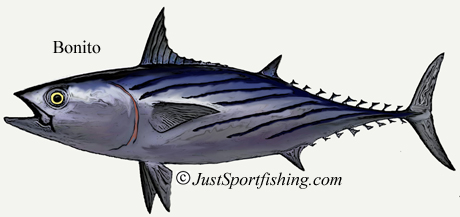|
Home Game Fish Fishing Knots Tackle Tips Videos Pictures Tips Rods & Reels Boats Cook your Catch Articles About Contact |
|
Donate to JustSportfishing.com and help to build the largest fishing information site on the web. Even a dollar or two will keep us building this free site. |
Bonito World
Record
~ Atlantic - 18 Lbs 4 oz.
Caught at Faial Island, Azores on July 8, 1953 by angler D. Gama Higgs
Pacific - 21 Lbs 3 oz. Caught at Malibu, CA on July 30, 1978 by angler
Gino M. Picciolo Scientific
name
~ Atlantic - Sarda Sarda Pacific
- Sarda Chiliensis Other
names ~ Common Bonito, Katonkel, Belted Bonito, California Bonito,
eastern Bonito, Pacific Bonito, bonehead, Laguna Tuna, Striped Tuna,
Ocean Bonito Identification
~ The body of the bonito is
cigar-shaped and somewhat compressed. The head is pointed and conical,
and the mouth is large. The color is dark blue to blue-green above,
dusky on the sides becoming silvery on the belly. There is a number of
slanted darkish stripes along the back. It can be distinguished from the
tuna by its slimmer body, a mouth full of teeth, and the dark lines on
its back rather than its belly. Size
~ The Atlantic Bonito Averages 2 to 10 pounds with a maximum size of
about 20 pounds and a length of 36 inches. The Pacific Bonito is the
larger of the two bonitos growing to a maximum of 25 pounds and 40
inches, although the average angler caught Pacific Bonito is much
smaller. Habitat
~ Pacific bonito occur discontinuously from Chile to the Gulf of Alaska,
with the greatest area of abundance in the northern hemisphere occurring
in warm waters between Magdalena Bay, Baja California, and Point
Conception, California. They are found between the surface and the
middle depths. Atlantic Bonito can be found in brackish water and
saltwater, particularly in tropical waters. They are a schooling fish
and often inhabit surface inshore waters. The Atlantic Bonito can be
found from Nova Scotia to Argentina. Feeding Habits ~ The Bonito feeds on
small schooling fish, squid, mackerel, menhaden, alewives, anchovies,
silversides, and shrimp. They can also be cannibalistic feeding on small
bonitos.
|


